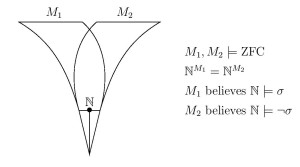This will be a talk for the Journées sur les Arithmétiques Faibles – Weak Arithmetics Days conference, held in New York at the CUNY Graduate Center, July 7 – 9, 2015.
Abstract. I will discuss several fun theorems and folklore results illustrating that the satisfaction relation of first-order logic is less absolute than one might have expected. Two models of set theory, for example, can have the same natural numbers  On the basis of these observations, Ruizhi Yang (Fudan University, Shanghai) and I have argued that the definiteness of the theory of truth for a structure, even in the case of arithmetic, cannot be seen as arising solely from the definiteness of the structure itself in which that truth resides, but rather is a higher-order ontological commitment.
On the basis of these observations, Ruizhi Yang (Fudan University, Shanghai) and I have argued that the definiteness of the theory of truth for a structure, even in the case of arithmetic, cannot be seen as arising solely from the definiteness of the structure itself in which that truth resides, but rather is a higher-order ontological commitment.
Slides | Main article: Satisfaction is not absolute

